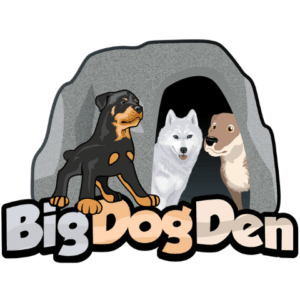It seems as though a big dog will eat almost anything! But not everything is good for them, is it? Balanced and high-quality nutrition is your big dog’s biggest need to live a long life and have a well-rounded personality. With all the large breed dog food options available these days, it can be hard to tell what’s marketing hype and what is actually the healthiest choice available for your big dog’s diet.
Your dog may have enjoyed his (or her) puppy food so much that you’re wondering “Can adult big dogs eat puppy food?” I’m 100% confident in telling you do NOT feed your adult big dog food formulated for puppies! I’ve done the research and gathered it all together right here…
Many resources out there state that it’s perfectly fine, and although it isn’t fatal or anything, puppy food is NOT the best diet for adult dogs. Especially large breed adult dogs. Let’s break the information down into bite-sized kibble to discover exactly why. Welcome to the big Dog Den, I’m glad you’re here!
In many of my articles, you’ll notice that I often include experiences and knowledge gleaned from owners of particular big dog breeds. That won’t be the case for this article. Today, we are gleaning from the experts who understand the science behind proper nutrition, and how a dog is benefitted by the right dog food formula for his (or her) specific stages of life. These experts include The American Kennel Club (AKC) the American Veterinary Medical Association (AVMA) and specific Big Dog Breed Clubs of America. The information you’re about to receive is the most accurate and up-to-date.
Why is Puppy Food Not Good for Adult Big Dogs?

Puppy food formulated for big dog breeds has more protein, calories and fat than adult dog food. Additionally, this puppy food is designed to help regulate growth. Your dog will be the most active and do the most growing during his (or her) puppyhood and adolescence.
In adulthood, your big dog will no longer need the extra calories and fat puppy food provides. Continuing to serve puppy food in your dog’s adulthood can lead to obesity, which increases the risk of many health problems developing! These risks include painful joint conditions, unnecessary stress on your dog’s heart, and even some cancers.
Adult dog food formulated for big breed dogs takes into consideration exactly what big dogs need to thrive. Make sure you bring up the subject of nutrition with your dog’s veterinarian. Adhere to the veterinarian’s advice, and always make sure you’re choosing dog food according to the ingredients list, and are not swayed by clever marketing hype.
To learn more about the different varieties of dog food formulas, you won’t want to miss “Small, Medium and Large Breed Dog Food: What’s the Difference?” right here in the Big Dog Den.
When to switch Your Big Dog To Adult Food
The ideal time to switch your big dog from puppy food to an adult dog food formula is when your dog is about 18 months of age. Some breeds take longer to mature and aren’t considered adults until the age of two, but you should still start weaning him (or her) off puppy food at about 18 months of age.
How to Switch Puppy Food to Adult Food Without Stomach Upset
Since dogs eat one primary food, switching that food can sometimes trigger an upset stomach and constipation or diarrhea. There’s a way to do it, though, that is gradual and gentle to your dog’s digestive system. Slowly introduce the new dog food over a week’s time. Mix 75% old food with 25% of new food for two days. See how he/she does. Then mix the foods 50/50 for two days. Next will be 75% new food and 25% old. After two days of that, if your dog has tolerated the changes well, you can feed your big breed dog 100% new food.
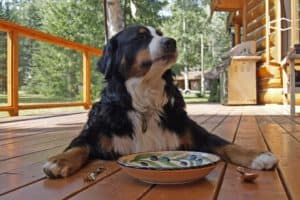
FAQ: What if my big dog develops diarrhea?
Your dog may when transitioning from puppy food to adult food. There may be times when your big dog may eat something that causes diarrhea. This can be uncomfortable for your dog at a minimum, painful or potentially dangerous at maximum. If introducing a new food is the culprit, here are some things you can try before consulting a veterinarian:
These are instructions
CANNED PUMPKIN: Mix canned pure pumpkin into his (or her) regular food. Do NOT use pumpkin pie filling! Pure pumpkin contains dietary fiber that soothes the digestive tract and absorbs moisture from the stool.
Use 1-2 teaspoons for smaller dogs and 2-4 tablespoons for larger dogs (up to a ½ cup).
OATMEAL: Cook some oatmeal. Do NOT use the flavored kind in a packet, use real whole oats or quick cook oats. Let it cool off. Your big dog should get from one to two cups. No salt or anything added.
BLAND FOOD: Cooked chicken or rice or both, plain with no seasoning added. You can add it to your dog’s regular food, or just serve the chicken and rice.
COTTAGE CHEESE OR YOGURT: Serve your dog about a cup of cottage cheese or plain yogurt in his (or her) food. This can be beneficial for firming stool without causing constipation if your big dog tolerates dairy products well. No salt or anything added. I personally haven’t used this for diarrhea, but know of others who reported success.
*List adapted from “Rottweiler Upset Stomach & Diarrhea” an article here in the Big Dog Den. To read it in its entirety, please follow this link.
Every time your dog moves his (or her) bowels, you must look at it for color, to make sure there are no worms, foreign objects he/she may have eaten, and there isn’t any blood or mucus present. This is so important!
If diarrhea doesn’t clear within 48 hours, you could try Kaopectate, an over-the-counter kaolin/pectin product, according to the dog’s weight. Some other dog owners have used this.
If your dog’s diarrhea hasn’t slowed, and the stool hasn’t firmed up in 72 hours, or if there is any sign of blood or mucus, consult your veterinarian immediately!
FAQ: Can big dogs eat “people food”?
I mentioned a couple of safe “people foods” just above for treating diarrhea in big dogs so yes, dogs can eat certain foods designed for humans. The reason it isn’t recommended is that our foods usually have ingredients in them that can be detrimental to canines. Spices, flavorings, and preservatives can lead to certain canine cancers and a plethora of digestion issues.
Therefore, if you intend to feed your dog “people food”, it’s best to prepare the dog’s food separately so that you can be precise in meeting the dogs’ nutritional needs. Make sure this home-made dog food provides protein from a single source as its main ingredient, then add simple carbs for energy, vegetables for vitamins and minerals, and essential fats from healthy sources.
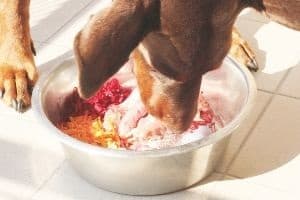
What Foods Are Harmful to Big Dogs?
Don’t let those “puppy-dog eyes get to you when it comes to what you will allow (or NOT allow) your fur-baby to eat. Let common sense prevail. The following 10 items consistently top every list put out by the experts regarding “people foods” that are dangerous (some even deadly) to dogs:
- Grapes
- Raisins
- Onions
- Garlic
- Chocolate
- Alcohol
- Xylitol (or any artificial sweetener)
- Candy
- Granulated Sugar
- Anything with Spices on it
FAQ: What if my big dog eats something poisonous?
The Top 5 Signs that Your Big Dog Ate Something poisonous are:
- Vomiting
- Diarrhea
- Seizures
- Blood in the Stool
- Lethargy
If your Big dog manifests any of those signs, call the veterinarian to let him (or her) know you’re on the way. It’s best if you can ascertain what the dog ate, but don’t waste too much time looking for evidence, get your dog to the vet!
Giving Your Big Dog Bones
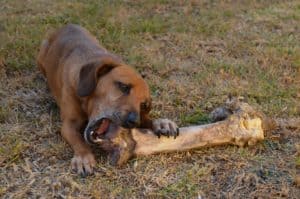
I don’t advocate rawhide bones because they are known for splintering off into sharp shards that can cause choking or injury. The same applies to any bone that has been cooked. That being said, chances are your big dog will love knawing on a big knuckle bone (or T-bone)! Bones help satiate your dog’s inherent need to chew, and bones can help to stifle boredom in your dog.’
Your local butcher or meat section in the market likely has bones suitable for hours of chewing enjoyment! Inquire at either place, and I think you’ll be delighted at the cost!
I use bones to my advantage Since my dog has separation anxiety while I’m away, his “reward” for staying home alone is always a fresh bone to distract him. To further your knowledge about bones as they pertain to your big dog, don’t miss “Can Big Dogs Eat Chicken Bones?” right here in the Big Dog Den!
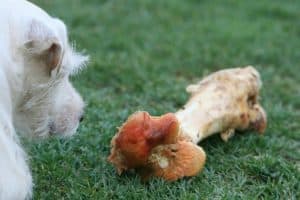
I hoped this article was clear, concise, and useful to you. The more we know, the better our big dog’s life will be, and the more pleasant pet ownership is. Before you leave, be sure to peruse our library of knowledge here in the Big Dog Den! If you have questions about your own big dog breed and don’t see it addressed here on this site, reach out to let me know. Stop in again soon!
*This article has been reviewed in accordance with our editorial policy.
